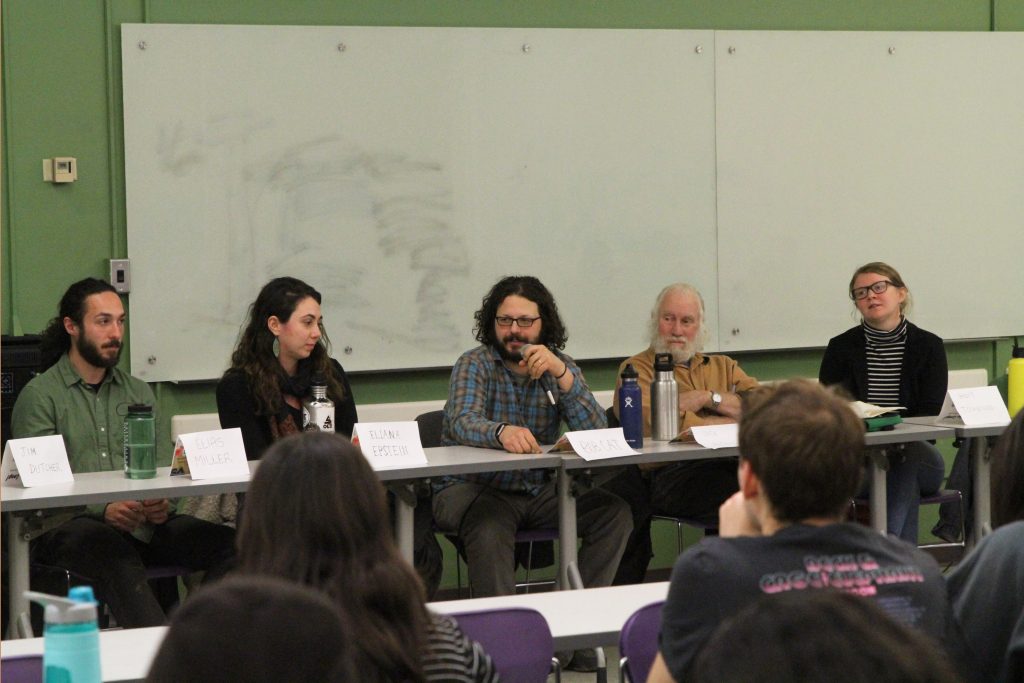The Binghamton community rallied behind food sustainability on Friday night with a panel discussion consisting of experts and advocates from local and campus-affiliated organizations.
The event was co-sponsored by two student groups, Intellectual Decisions on Environmental Awareness Solutions (IDEAS) for Binghamton and Animal Alliance, with the intent of informing Binghamton University students of the impact of unsustainable farming and diets.
Paris Martin, outreach coordinator of IDEAS and a senior majoring in environmental studies, said the point of hosting the event was to encourage students to be more mindful of food sustainability.
“Food sustainability obviously has a lot of impacts on our environment, on our health and on climate change,” Martin said. “I feel it’s really important to get information out there about how we can be better in our food consumption, because that’s not going to go away, the impact it has and seeing that there is light at the end of the tunnel, which I’m hoping [the panelists] are going to give us some sense of mind to.”
Dick Andrus, founder of the environmental studies program at the University, has taught issues regarding food sustainability for more than 40 years and spearheaded the discussion on the unsustainable modern farming industry. Andrus said food sustainability is hurt by big farms with capitalist interests.
“Most of the food that is produced in the country is produced on huge farms,” Andrus said. “It’s done that way because it works in a capitalist account. It gets you the most calories for your buck. If you’re going to spend your time building up the soil, you’re not going to make money today … You’ve got to make it today, otherwise, you won’t be around tomorrow.”
Panelist Bob Cat, co-owner of Main Street Farms in Cortland and a board member for Northeast Organic Farming Association (NOFA), said sustainable farming is a dying art because of the lucrative nature of the mass farming industry.
“We can make the world a better place through supporting our local farms and just showing up and celebrating the farmer,” Cat said. “We work really hard for long hours for not that much money. There’s a lot of people who say, ‘I want to eat healthy, but it’s too expensive.’ Well, that’s what real food costs. If you work a job, you want to be paid in your time for what you’re working for, so why is it okay that we pay a doctor or we pay a mechanic what they’re worth, but for some reason farmers — they’re all struggling.”
Cat said he aims to educate communities on supporting both organic and local farms, which he defines as originating within a day’s drive, or approximately 500 kilometers. Although the panelists all try to eat as locally as possible, Andrus admits that eating locally does have its drawbacks.
“Health-wise, I should eat bananas,” Andrus said. “But ethically, I just can’t do it.”
Nicholas Walling, a junior majoring in computer science, said the panel discussion encouraged him to think more about spending the extra money on food for the shot at a sustainable future.
“Hearing the panelists speak on the importance of buying from local, sustainable farmers and paying for the real cost of food, which includes the environmental costs of growing sustainably, has convinced me to spend the small amount of extra money it takes to buy local produce,” Walling said. “They even made me aware of the local farmers market in Binghamton.”
Another panelist, Hope Townsend, program assistant for Volunteers Improving Neighborhood Environments (VINES), said VINES’ main goal is to create a just and sustainable food system for the Binghamton area. VINES owns a two-acre community-supported agriculture (CSA) farm composed of an urban farm as well as a community garden. Open year-round, the CSA farm offers semester-long subsidized memberships for students.
Panelists also recommended that students looking to live more sustainably should visit the Food Co-op located in the University Union, a student-run local and organic grocery store on campus.
The discussion highlighted another opportunity for students to get involved in food sustainability through the Binghamton Food Rescue, a local organization that picks up and redistributes food from farmers markets within 24 hours. Eliana Epstein, director of Binghamton Food Rescue and a second-year graduate student studying sustainable communities, said it is not local farmers who are the biggest food wasters, but supermarkets who throw out over 40 percent of their inventory.
“Farmers markets and farmers aren’t the big food wasters in this country — [they’re] supermarkets,” Epstein said. “Ideally, in the future, we can form more of a relationship with supermarkets and maybe even do some local policy work.”
According to Epstein, Binghamton Food Rescue is always looking for student volunteers to help sort through the food they receive or help distribute it if they have cars.
Rasleen Kukreja, a first-year graduate student studying business administration, attended the panel discussion and said she made the switch to a more sustainable lifestyle two years ago, but feels sustainability options should be marketed more by the University.
“BU Acres and composting is not really supported by the University,” Kukreja said. “I’m an off-campus student and I have a lot of organic waste because I cook every day. If I could bring it to BU Acres, it could make a difference.”



